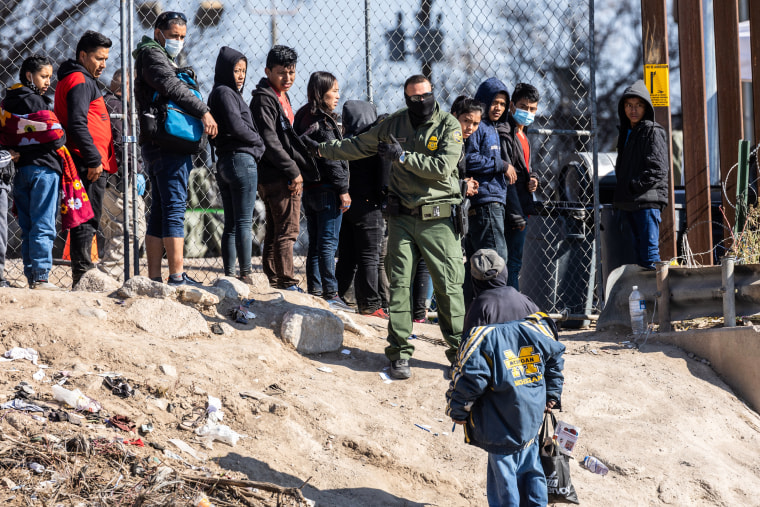[ad_1]
WASHINGTON — The Supreme Court on Tuesday allowed Title 42 — a Trump-era immigration policy implemented when the pandemic broke out to quickly expel asylum-seekers at the border — to remain in effect for now, putting a judge’s ruling that would have ended it last week on hold.
The court voted 5-4 to grant an emergency request by 19 Republican state attorneys general who sought to intervene in defense of the policy. The decision puts on hold a ruling by Washington-based U.S. District Judge Emmet Sullivan, who said the Centers for Disease Control and Prevention’s implementation of the policy was “arbitrary and capricious.” Sullivan’s ruling was due to go into effect Dec. 21.
Conservative Justice Neil Gorsuch joined the three liberals on the court in voting against the stay request. The brief court order said that while the administration cannot set aside the Title 42 policy, the decision “does not prevent the federal government from taking any action with respect to that policy.”
The Supreme Court also agreed to hear oral arguments in February and rule on whether the states can intervene, with a decision due by the end of June. The policy will remain in place at least until that ruling is issued.

Gorsuch suggested in a dissenting opinion that the court’s decision to intervene seemed to be more related to the crisis at the border than the legal issues in the case, which concerns whether the states can intervene in defense of a pandemic-era policy, noting that the states “do not seriously dispute that the public-health justification undergirding the Title 42 orders has lapsed.”
Gorsuch acknowledged that the states may have valid concerns, but, he added, “the current border crisis is not a COVID crisis. And courts should not be in the business of perpetuating administrative edicts designed for one emergency only because elected officials has failed to address a different emergency. We are a court of law, not a policymaker of last resort.”
The court’s intervention averts what many had predicted would be an additional surge of people seeking to enter the United States at a time when border crossings are already high. Without the policy in place, people seeking asylum would be able to enter the U.S., where they could be waiting for years for a court date if they pass their initial interview with authorities.
Title 42 is strongly backed by Republicans alarmed at the number of people crossing the southern border and it is opposed by immigrant rights groups, who say it is inhumane. Some Democrats, including West Virginia Sen. Joe Manchin, have expressed support for it being kept in place at least temporarily. Another Democrat, California Gov. Gavin Newsom, has warned that the system for handling migrants seeking asylum would “break” if Title 42 is ended.
White House press secretary Karine Jean-Pierre said in a statement Tuesday that the administration would comply with the Supreme Court’s order while “advancing our preparations to manage the border in a secure, orderly, and humane way when Title 42 eventually lifts and will continue expanding legal pathways for immigration.
“Title 42 is a public health measure, not an immigration enforcement measure, and it should not be extended indefinitely,” she added.
Chief Justice John Roberts on Dec. 19 placed a temporary hold on Sullivan’s ruling while the Supreme Court weighed its next steps.
States led by the Republican attorneys general of Arizona and Louisiana filed the emergency request last week after the U.S. Court of Appeals for the District of Columbia Circuit rejected their request to intervene in the case in a bid to prevent the policy from being wound down.
The states argued that President Joe Biden’s administration had “abandoned meaningful defense” of the rule, saying it effectively engineered, with the help of lawyers challenging the policy, a ruling that would end it. As a result, the states sought to intervene to keep it in place. The appeals court had said in its order that the states waited too long before they tried to intervene.
In a separate case, the administration’s previous effort to unwind the policy had been blocked by a federal judge.
Title 42, named after a section of U.S. law, gives the federal government power to take emergency action to keep diseases out of the country. Then-President Donald Trump invoked it when the coronavirus pandemic broke out in March 2020, and it has remained in effect during the Biden administration. More than 2 million people have been expelled from the country as a result.
Many nationalities and demographics have been exempted from the policy, including children traveling unaccompanied and some nationalities whose countries refuse to repatriate them, such as Cuba, Nicaragua and, until recently, Venezuela.
Various civil rights groups, including the American Civil Liberties Union, challenged the policy on behalf of people affected by it.
“The Supreme Court has allowed Title 42 to remain in place temporarily while the case is ongoing, and we continue to challenge this horrific policy that has caused so much harm to asylum seekers and cannot plausibly be justified any longer as a public health measure,” ACLU attorney Lee Gelernt said in a statement Tuesday.
[ad_2]
Source link
